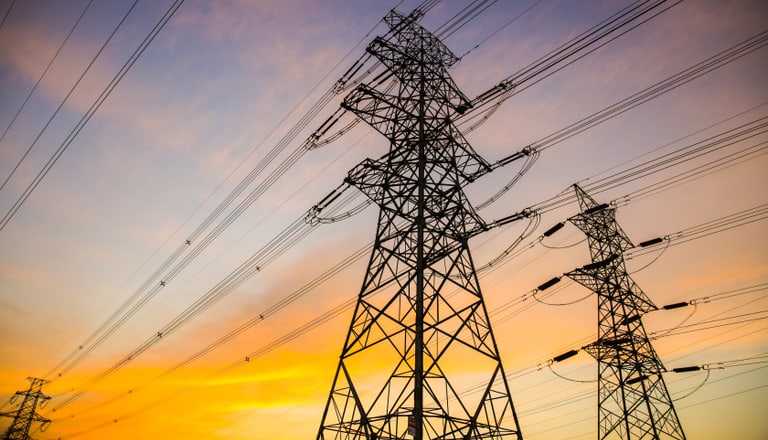
‘A lot of people just take electricity for granted’
But what if our lights suddenly went out? An electricity shortage is one of the biggest risks facing Switzerland. In this interview with Daniel Schriber, Maurice Dierick from Swissgrid, the national grid company, explains why he shares the view held by the Federal Office for Civil Protection – and tells us how Switzerland has prepared for this scenario.
Maurice Dierick, the risk report issued by the Federal Office for Civil Protection lists an electricity shortage as the biggest risk faced by Switzerland. How do you see this?
Almost everything needs electricity to work, nowadays. Electricity is one of the most important goods in our modern, industrialised society. The transmission grid plays a key role in this, acting as Switzerland’s backbone in terms of electricity supply. As a result, the Federal Office for Civil Protection believes that an electricity shortage would be the biggest risk, and rightly so.
Why is the risk so high?
First off, we need to clarify the difference between an electricity shortage and an electricity outage. An electricity outage is a large, regional electricity black-out lasting several days. They happen in real time, without any prior warning. An electricity shortage is a shortage under article 2 of the National Supply Act. The corporate sector cannot overcome this kind of incident on its own. However, in principle, Switzerland’s electricity grid is one of the most secure in the world.
But?
System stress, or system load, will increase over the medium to long term. New renewable energies do offer production capacity, but as yet, they do not have the same stability in terms of the amount of energy produced compared to traditional forms of generating electricity. In fact, their volatility actually makes the system less stable. In addition, over the past four or five years, we’ve seen that our system is somewhat vulnerable.
What does that actually mean?
Dry summers and low water levels in the rivers lead to a greater dependence on nuclear power and electricity imports from overseas. If the amount of nuclear power produced is reduced without being replaced, the amount of electricity imported needs to be increased. As a result, Swissgrid has increased transformer capacity on the northern border as a matter of priority. Due to the energy transition, the interim phase, where we will be dependent on importing electricity in winter, will be fairly risky for the next 5 to 15 years, until the new energy system has stabilised.

Helping to keep Switzerland’s lights on: Maurice Dierick, Head of Market and member of the Executive Board at Swissgrid
What can cause an electricity shortage?
There are various factors: too little water in reservoirs and rivers, the loss of nuclear power plants without there being a sustainable replacement, or reduced opportunities to import electricity from other countries in Europe. It’s important that we see these factors as being fully interconnected.
Politically speaking, it is technically impossible to be an electricity island – so we need to avoid that at all costs.
How important is cross-border exchange in terms of electricity?
We are tightly intertwined with the European grid (Switzerland has 41 cross-border cables) and this makes a fundamental contribution to stability: the more tightly knitted a grid is, the less the impact if one of these stitches, figuratively speaking, comes undone. However, if there is major disruption, everyone is affected by it. Politically speaking, it is technically impossible to be an electricity island – so we need to avoid that at all costs. To achieve this, though, we need an electricity agreement with the EU.
Switzerland has always played a pivotal role in Europe’s electricity market. Without an electricity agreement, this role is in danger: what would be the consequences of this scenario?
We can only talk about the consequences of the electricity agreement in this context. The stability of Europe’s interconnected grid is based on the principle that all the parties involved in it will play by same rules. The EU’s goal is to create a single market for electricity. While the EU is making progress with implementing its third internal market packet, the rules for grid and market operations set down in this are becoming ever-further removed from the corresponding Swiss legislation.
Can you give an example of this?
Even today, Swiss market stakeholders are excluded from ‘day ahead’ and ‘intraday’ market coupling with the EU. This means that Swissgrid is being excluded more and more because we need to keep more energy to one side in Switzerland to stabilise the grid. In turn, we would not be able to use this energy to provide end customers with electricity, which would also lead to higher costs.
And what would the consequences be?
Without an electricity agreement, the gulf between Swiss and European law will become even larger, as neither the revision of the Electricity Supply Act nor the Energy Act reflect key aspects of European law. This means that, without an electricity agreement, key questions in terms of liability, costs and dispute resolution remain unanswered.
We need to make people more aware of the importance of critical infrastructure.
Has the pandemic contributed to the key stakeholders spending more time looking at the scenario of an electricity shortage?
A lot of people just take electricity for granted. We need to make people more aware of the importance of critical infrastructure. The companies operating the transmission grid do a lot to help with that themselves. In Switzerland, as in the rest of Europe, balancing power is kept aside for use in the event of unforeseen fluctuations in production or consumption and is used to stabilise the grid in an emergency. Similarly, Switzerland’s Federal Office for National Economic Supply (FONES) and its Organisation for Power Supply in Extraordinary Circumstances (OSTRAL) mean that the country has a good foundation on which to deal with an electricity shortage.
Risks facing Switzerland
The Federal Office for Civil Protection FOCP put together a risk report that sets out the risks facing Switzerland. They include natural disasters of every kind, large-scale cyber-attacks, pandemics and electricity shortages. These high-level risks pose a challenge for insurers because it is not possible to provide comprehensive coverage for them in purely commercial terms. The potential for damage exceeds insurers’ capacity. In addition, the damages are not independent of each other, occurring simultaneously. This makes it impossible to distribute the risk, which is a key tenet of insurance. Insurance companies are striving to find solutions to these risks in conjunction with partners such as the federal government to ensure these risks are not an unaffordable financial burden for businesses and society alike.
By 2025, Swissgrid will have invested CHF 2.5 billion in the regular maintenance, upgrading and needs-based expansion of the electricity grid. What role does expanding the grid play in stabilising the system?
The fraught situation in terms of energy and the grid that we saw in winter 2015/2016, with very low reservoir levels, highlighted the urgency of expanding the grid, particularly in terms of import capacity. ‘Strategic Grid 2025’ saw Swissgrid set out the grid that Switzerland will need by 2025, taking into account the 2050 energy strategy. This is the only way to guarantee an excellent security of supply and the associated competitive edge for the Swiss economy in the long term.
How important is expanding the grid in conjunction with the increasingly important role played by renewables?
Even today, the network is not being expanded at the same rate as which renewable energies are growing. If the promotion of renewable energy leads to the number of network projects increasing, this would exacerbate the issue further. As far as operations go, the consequence of this would be unusual network flows and shortages. We also need new, innovative solutions to compensate for losing traditional sources.
For example?
The electricity system needs to become more flexible, in light of the ever-larger proportion of fluctuating renewable energies and the planned decommissioning of nuclear power plants. Alongside power stores or water reservoirs, we could also see additional technologies that would make it possible to transfer energy from summer to winter. The cost-effective, secure use of decentralised resources to support flexibility, like stores, electric cars, battery storage and heat pumps is a promising approach that could make the electricity grid more flexible on the consumers’ side.
About
Maurice Dierick joined Swissgrid in February 2015. A mechanical engineer, he has been a member of the Executive Board since June 2016, initially as Head of Grid and then, since January 2019, as Head of Market.
About Swissgrid
Swissgrid is the national grid company, and as the owner of the grid, is responsible for operating Switzerland’s high voltage grid in a secure and non-discriminatory way and carrying out eco-friendly and efficient maintenance, upgrades and expansion. Founded in 2006, the company employs around 600 staff at its sites in Aarau, Prilly, Castione, Landquart, Laufenburg, Ostermundigen and Uznach. Various Swiss electricity companies jointly hold the majority of Swissgrid’s equity capital.
You may also be interested
- Viewpoint | 10 December 2025
CHF 526 billion benefiting people, environmental and sustainability issues
Insurers are major institutional investors with a long-term investment horizon and a preference for safety.

- Interview | 6 October 2020
«Sustainability is a central issue for insurance companies»
Climate change is accelerating and now affects all areas of our lives. Gunthard Niederbäumer explains what insurers can and should do to slow down this trend.

- Context | 10 February 2021
Large risks explained in brief
Why can’t a pandemic be insured by private insurers alone? Our latest explanatory video shows the reasons.
